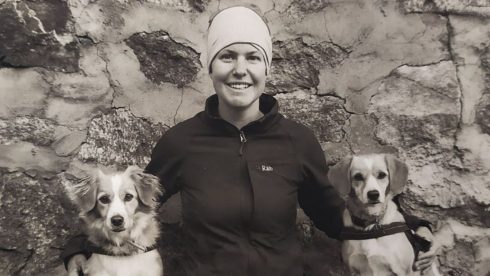THE mother of Esther Dingley, the British hiker who disappeared in Pyrenees last November, faces an agonising wait while police analyse bones found on a mountain pass at the border between France and Spain last week.
Police have requested a DNA sample from Ria Bryant, 74, the mother of the missing woman, and have asked for her dental records to be sent from the UK to France for comparison with remains found near a path on Friday.
Two Spanish runners came across what is reported to be a human skull on Friday afternoon near Puerto de la Glera, and alerted police. French Gendarme are investigating after it was determined the find was in French territory.
Bryant has been told by police that the identification process could take as long as a week.
In an interview with The Sunday Times she also said that police had told her that after extensive search of the area where the skull was discovered, one other unidentified bone had been found but no traces of belongings, which included a rucksack and yellow tent.
She said: “It’s upsetting that it’s not clear and definitive.”
Dingley, 37 disappeared last November while hiking on her own in a region that criss-crossed the border between Spain and France. Her boyfriend Dan Colegate who was waiting for her in France raised the alarm when she failed to arrive.

Dingley’s boyfriend Dan Colegate who has been conducting his own search retracing possible routes that she may have taken, described the mountain path where bones were found as an easy route that was ‘well within her capabilities’.
In a dossier he released in January through LBT Global, an organisation which helps the relatives of those who go missing abroad, outlining possible routes Dingley may have taken in the hope it would help the search for her, Colegate said Puerto de la Glera – Port de la Glere in French – formed part of the route she had been most likely to take.
He wrote: “An individual that Esther met on November 19 came forward to say he had specifically suggested this route through France, between Port de Venasque and Port de la Glere, to Esther when he met her.
“There is no reason to think that Esther did not stick to this plan.”
Under a section titled ‘Esther’s Planned Onward Route’, he wrote that it was likely that Dingley slept overnight in the mountain refuge in France before continuing a hike to return to her initial starting point in Spain.
He said: “Her onward route would have involved a descent northwards towards the Hospice de France, a flat traverse westwards around the Imperatrice Way, and a climb southwards to the border at Port de la Glere.
“From the border the route descends back towards Hospital de Benasque.
“This route would have been well within Esther’s capabilities for a day hike, in addition to the fact she had a tent, camping equipment and significant experience using it.
In the final message she sent to Colegate on November 22, Dingley wrote: ‘Might dip into France. Hoping Refuge Venasque has a winter room. Keep you posted when can. Love you xxx’
Puerto de la Glera is close to the 8,796ft Pico Salvaguardia summit where Oxford graduate Dingley last made contact with Colegate around 4pm on November 22 last year.
Mountain search teams from both the Spanish and French forces had carried out several searches of that area, initially when Dingley went missing before searches were called off in bad weather.
Winter snow meant searches were suspended but they were resumed in spring when teams were hopeful the snowmelt might reveal something.
A co-ordinated air and land search by police mountain rescue experts from both countries took place on July 1.
However, searches on the ground and from the air had been fruitless.
In an interview with the BBC earlier this month, Colegate said he could not rule out his girlfriend, who was an experienced hiker, had been the victim of crime.
READ MORE:
